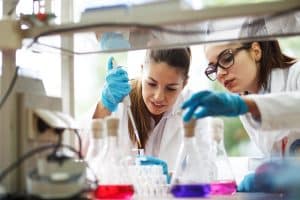Summer Scholars Program (SSSP)
The Summer Scholars Program (SSSP), in collaboration with Seattle Children’s Research Institute, offers a unique and immersive experience for undergraduate students who are interested in careers in science and medicine.
Conduct real experiments in labs, study medical cases in detail, and go on visits to leading organizations that research health. This program teaches about the latest in medical technology, including gene editing, ways to boost the immune system, and new methods to repair damaged body parts. This program gives future scientists like you the basic skills you need in biology.
Get a real sense of what research is like and how it makes a difference. If you’re interested in a career in science, whether it’s in a research lab, a hospital, or a clinic, this program is a great way to learn about all the different jobs that help improve people’s health.
What is the Summer Scholars Program (SSSP)?
The Summer Scholars Program (SSSP) offers an exceptional opportunity in Biomedical Research and Global Health, in partnership with Seattle Children’s Research Institute. This program is specifically crafted to assist you in exploring a multitude of career avenues within the biomedical research and healthcare sector.
Throughout SSSP, you’ll build a solid foundation in biological sciences and research by engaging in hands-on laboratory work. You’ll also analyze case studies related to preventing and treating diseases. You’ll have the chance to visit local organizations involved in biomedical research and listen to guest lectures from local researchers.
The curriculum covers cutting-edge technologies like gene editing, immunotherapy, and regenerative medicine. It’s packed with real research experiences and practical applications that aim to improve human health. You’ll gain insights into the wide range of career opportunities available in laboratories, hospitals, and clinics.
You will be learning from an experienced doctoral scientist who holds a Ph.D. in Biology from the University of Washington. She is the founding instructor of the Biomedical program, ensuring that you receive top-notch guidance and knowledge in this field.

Why should you join the Summer Scholars Program (SSSP)?
Why should you consider becoming a part of the Summer Scholars Program (SSSP)? This program has a clear mission: to offer undergraduate students a unique opportunity to participate in research projects during the summer at the Seattle Children’s Research Institute. You’ll work closely with experienced researchers and principal investigators, gaining invaluable hands-on experience in basic, clinical, and translational research.
SSSP is particularly committed to promoting diversity in the biomedical and health sciences. If you identify as one of the following, you are strongly encouraged to apply:
- Black or African American
- Hispanic or Latino
- American Indian or Alaska Native
- Native Hawaiian or other Pacific Islander
- Individuals with disabilities are defined as those facing physical or mental impairments that significantly impact daily life activities, as outlined in the Americans With Disabilities Act of 1990.
- Individuals meeting two or more of the NIH criteria for disadvantaged backgrounds.
As a Summer Scholar, you will have the chance to learn how to use lab equipment or specialized software for research projects, depending on your focus. You’ll regularly meet with mentors who will guide you through your research journey, helping you gain critical research experience.
Moreover, this program isn’t just about lab work. You’ll also attend career and professional training sessions that cover essential topics like abstract writing, research poster presentations, and effective networking strategies.
You’ll engage with accomplished leaders in the field who will share their career paths and valuable insights. Your commitment will involve dedicating up to 35 hours each week to your research project, with an additional five hours weekly for professional development. This includes attending career and professional development sessions and preparing your research abstract and poster.
The culmination of your SSSP experience will be the publication of an abstract summarizing your research project, followed by a presentation of your findings at the program’s poster symposium during the final week. Join us in this enriching program and take the first steps toward a future in biomedical and health sciences research.
A. Compensation
During your participation in the program, you will receive a payment of $20 per hour for a total of 40 hours each week. It’s important to note that the income you receive will be subject to taxes, so the actual amount you see on your paycheck will be less than the $20 per hour.
The program itself spans a duration of nine weeks, allowing you to gain valuable experience and knowledge over this period.
As part of their commitment to your success, the Seattle Children’s Research Institute will conduct surveys to understand any travel and housing requirements you may have. Their program staff will work closely with you to assess your needs and provide assistance wherever possible to ensure a smooth and comfortable experience during your time with us. Your comfort and well-being are important, and they are here to support you every step of the way.
B. Approved Equivalency Credits
You can earn 0.5 credits in English and 1.0 credits in Lab Science by successfully completing this program. These credits are equivalent to what you would typically earn in a school setting.
C. College Credits
In addition to the equivalency credits mentioned above, you also have the opportunity to earn college credits through this program. You can earn up to a maximum of 10 college credits during your participation. These credits can be a significant boost to your academic journey and may be transferable to your future college or university studies, depending on their policies.

How do you get into the Summer Scholars Program (SSSP)?
To be eligible for the program, applicants should have a solid background and a genuine interest in one of the following fields: biology, biochemistry, microbiology, neuroscience, mathematics, behavioral health, public health, or a related scientific field. No prior formal research experience is required, and SSSP prioritizes applicants who are seeking their first formal research internship as it maximizes the program’s impact.
Applicants must be able to reside in Seattle or within commuting distance for the entire duration of the program. It’s important to commit to participating fully and attending the entire internship program, as the program’s curriculum is comprehensive and doesn’t allow for time away or vacations. Late starts or early departures cannot be accommodated.
How do I apply to the Summer Scholars Program (SSSP)?
When applying for the Summer Scholars Program (SSSP), you will need to select your top three research projects from the program’s provided list of research areas. It’s essential to explain how your skills and interests align with these projects. Keep in mind that while SSSP will use your preferences to match you with a project, you may not necessarily be placed in one of your top three choices.
You will have the option to pick all three projects from either the Basic Science/Bench Research category or the Clinical/Behavioral Research category. Take some time to review these lists and consider the following:
I. Basic Science/Bench Research Projects
If your passion lies in exploring the inner workings of biology and the processes behind diseases, then you’ll want to pay special attention to the Basic Science/Bench Research projects.
These projects offer a hands-on experience in a lab environment, where you can delve into the scientific study of living organisms and their components, as well as understand how diseases develop and function at a fundamental level.
It’s an ideal match for those who are keen on conducting experiments and analyses that contribute to the basic understanding of life science and health conditions.
II. Clinical/Behavioral Research
If your interests are more aligned with research that directly impacts patient care and health outcomes in a clinical or community environment, then the Clinical/Behavioral Research projects should be your focus.
These projects are designed for those who are enthusiastic about exploring medical issues that affect patients in real-world settings like hospitals or communities. In these projects, you will have the opportunity to engage in research that has a direct and practical application in improving the health and well-being of individuals.
This area of study is perfect for those looking to make a tangible difference in healthcare practices, patient experiences, and overall community health.

Minimum Job Qualifications:
To apply, you must meet the following minimum qualifications:
- Be at least 18 years old at the start of the program and eligible to work in the U.S.
- Be currently enrolled or planning to enroll in an undergraduate, community, or technical college and be in good standing with your institution. Graduate school or medical school students are not eligible to apply.
- Possess excellent communication, interpersonal, and organizational skills, including attention to detail.
- Follow all procedures for maintaining the confidentiality and privacy of research-related data and information related to Seattle Children’s business operations.
- Conduct yourself in a manner consistent with Seattle Children’s core values of compassion, excellence, equity, innovation, integrity, and collaboration.
Preferred Job Qualifications
This program actively encourages students from backgrounds that are historically underrepresented in the biomedical and health sciences, as defined by the NIH, to apply. Your unique perspective and experiences can contribute significantly to the program’s diversity and enrich the learning environment for everyone.
Resume
As part of your application process, you’ll need to provide a resume that includes the following details:
- Your full name.
- Contact information, including your address, phone number, and email.
- Information about your college, including the expected year of graduation.
- Your chosen major (or anticipated major) and any minor if applicable.
- Your current GPA.
- Any awards or honors you’ve received.
- Details about your volunteer or work experience, such as involvement in church activities, community service, clubs, or organizations.
- Any leadership roles you’ve held.
- Mention your relevant skills and strengths.
- Cover Letter/Personal Statement: Your cover letter or personal statement is a crucial part of your application. Here’s what you should include in it:
1. Introduce yourself and explain why you’re interested in this internship program.
2. Describe how you envision contributing to diversity, equity, and inclusion in the field of science and medicine.
3. Share your career goals and how you believe this internship will help you achieve them.
If you have prior research experience, mention it. But don’t worry if you don’t have research experience; it won’t necessarily disqualify you from the internship. Express your passion for the type of research you’re interested in pursuing.
Mentor Letter of Reference
Applicants are required to upload a professional letter of reference along with their application. It’s important to give your reference several weeks to complete this letter. Your reference should be someone who can vouch for your abilities and character in a professional context.
This could be a science professor, a work supervisor, a coach, or another mentor who knows you well in a professional or academic setting. It’s not advisable to have a friend or family member serve as your professional reference.

Basic Science/Bench Research Projects (Non-Comprehensive)
1. Evaluating patient-derived genetic variants for effects on gene function using CRISPR editing in C. elegans
This project is about using CRISPR technology in a type of worm called C. elegans to study genetic variations that might be related to neurodevelopmental issues in humans. Under the guidance of the Grill lab, the goal is to edit the C. elegans’ genes to resemble the human genetic conditions and understand how these changes affect certain proteins that send signals in the cell, which are important in many brain disorders.
2. Understanding the malaria parasite life cycle
This project focuses on understanding the life cycle of the malaria-causing organism, Plasmodium. This research is crucial because malaria affects hundreds of millions of people and causes many deaths each year. By joining a research team, participants will investigate the genetic factors that influence how malaria develops and survives throughout its different life stages.
3. Identifying and characterizing phage for drug-resistant mycobacteria
In this research project, students will confront the challenge of antibiotic resistance by studying bacteriophages, which are viruses that can infect and kill bacteria.
This work is significant because it involves the family of bacteria responsible for tuberculosis, one of the deadliest diseases worldwide. The project aims to find and improve bacteriophages that could be used to treat drug-resistant bacterial infections, a pressing issue in medicine.
4. Synthesis and identification of Novel Compounds for the treatment of Tuberculosis
This project aims to understand the biology of the bacteria that cause tuberculosis and to create new treatments for both drug-sensitive and drug-resistant forms of the disease. Researchers in this project will explore how the bacteria resist antibiotics and look for new drug targets, using early-stage drug discovery techniques that include assays, screening, and chemical synthesis.
5. Assessing why HIV progresses more rapidly to AIDS in infants
This project looks into why HIV progresses faster to AIDS in infants than in adults, using an animal model for the study. The research intends to understand the immune responses involved and explore potential treatments to slow down the disease progression in infants.

Clinical/Behavioral Research Projects (Non-Comprehensive)
1. Concussion Health Improvement Program (CHIP) Study
The Concussion Health Improvement Program (CHIP) Study addresses the serious issue of post-concussive symptoms (PPCS) like headaches, fatigue, and concentration problems in over 1 million U.S. youths affected by concussions annually.
Many of these youths face challenges that affect their social lives and education. The study aims to test various strategies to support affected youths and their families. Participants in the study will observe and categorize recorded sessions with patients and help with survey distribution and collection.
Another part of the program offers scholars the opportunity to engage in adolescent mental health screening, which serves as an additional project within the CHIP Study.
2. Evaluating diagnostic delays in childhood-onset lupus
The second project focuses on lupus, a severe autoimmune disease that particularly affects young women, notably of Black and Hispanic descent. The scholar’s role involves extracting data from medical records to study delays in diagnosing lupus in children. This experience will deepen the scholar’s understanding of lupus, healthcare disparities, and the functioning of health systems.
3. Unveiling the Hidden Truths of Clinical Data: The Art of Statistical Programming
This project emphasizes the importance of programming skills in data analysis for clinical research. Scholars will join the Therapeutics Development Network Coordination Center (TDNCC) at Seattle Children’s, which assists with cystic fibrosis studies. Interns will be involved in analyzing data, learning about statistical software, and presenting their findings.

4. Query Our Way to Quality: Improving Clinical Study Data and Results with Database Queries and Resolution Metrics
Clinical research is essential for assessing the safety and effectiveness of new medical treatments. High-quality data from these studies influence future research directions, establish medical guidelines, and ensure patient safety.
To maintain data integrity, a process called “data querying” checks for errors or inconsistencies in the collected data, which can be a complex and detailed task. The Therapeutics Development Network Coordinating Center (TDNCC) offers internships that involve evaluating and improving this data querying process for studies related to cystic fibrosis.
Interns gain comprehensive training in clinical research processes, including opportunities to work with leading researchers, learn about various career paths in the field, and participate in discussions about diversity in research.
5. Exploring environmental influences on pediatric health behavior change
This project allows scholars to investigate how our environment influences childhood health behaviors, particularly regarding weight management. They will learn how to link geographic data with demographics and health outcomes, contributing to family-based intervention trials.

How hard is getting into the Summer Scholars Program (SSSP)?
Gaining a spot in the Summer Scholars Program (SSP) at Seattle Children’s Research Institute can be quite challenging. This is because the program is known to be selective, accepting a limited number of students each year.
In 2023, only 49 students were admitted from a pool of over 500 applicants. While the specific acceptance rate is not publicly disclosed, this data suggests that less than 10% of applicants were accepted, highlighting the program’s competitive nature.
To be considered for the program, applicants must meet certain criteria. They need to be at least 18 years old by the time the program starts and must be eligible to work in the United States.
The program is open to individuals who are currently enrolled in an undergraduate program at a university, community college, or technical college and are maintaining good academic standing at their respective institutions.
Graduate and medical school students are not eligible to apply. This means that the program is specifically designed for those at the undergraduate level seeking to gain research experience and professional development in a highly competitive setting.
When is the deadline to apply to the Summer Scholars Program (SSSP)?
The application period will close promptly at 5 p.m. Pacific time on January 12, 2024.
Before you submit your application, we strongly recommend that you take the time to carefully review the eligibility criteria and program expectations.
This will help ensure that you meet all the requirements and understand what is expected of you as an applicant. Your thorough preparation will increase your chances of a successful application.

When do I find out about my application to the Summer Scholars Program (SSSP)?
From January 13 to March 15, they will be thoroughly reviewing all applications. This period is also when the admissions team will be conducting interviews, which will take place in February. The purpose of these interviews is to identify the most suitable candidates for the research projects.
By March 15, all applicants will receive a notification informing them if they have been selected for the internship or not.
For those who are chosen, there will be an onboarding process from March 10 to June 17. This is to prepare the interns for their roles and responsibilities during the internship. After the internship, in the fall, the institute will publish and share a report on the Summer Science Scholarship Program.
Look out for the notification regarding your application by March 15, but do not send emails inquiring about your application status before then.
The institute also requests that you avoid reaching out to the principal investigators directly. This ensures that the application and selection process is fair and follows the planned procedures.

The Role of Mentorship in Enhancing Your Summer Scholars Program (SSSP) Experience
The Summer Scholars Program (SSSP) at Seattle Children’s Research Institute isn’t just a training ground for aspiring researchers—it’s a nexus where mentorship bridges the gap between academic learning and real-world scientific achievement.
The program pairs each scholar with a mentor who is a seasoned expert in fields such as molecular biology, clinical research, or public health. These mentors are not only advisors but also active contributors to their fields, often having published significant research or led groundbreaking studies.
A mentor with a background in pediatric neurology might guide a scholar through a project on neurological disorders, providing hands-on experience with advanced diagnostic tools and sharing insights from their latest research findings.
This kind of mentorship enables scholars to understand the practical implications of their studies and the potential impact on child health and patient care.
Beyond the lab, mentors facilitate connections that can lead to collaborative opportunities with renowned institutions. A mentor could, for instance, introduce a scholar to a research consortium working on a multi-center clinical trial, providing a broader perspective on how large-scale research collaborations function.

Mentors also exemplify the importance of resilience in scientific inquiry. They share their journeys, including the setbacks they’ve faced in their research endeavors, how they navigated funding challenges, or what strategies they employed to get a breakthrough study published. These narratives provide scholars with a realistic picture of the perseverance required in the scientific world.
Furthermore, mentorship in the SSSP encompasses the development of leadership and ethical decision-making. For instance, scholars may engage in ethical debates moderated by their mentors on topics like genetic privacy or clinical trial design, helping them to understand the complex moral landscape of biomedical research.
The SSSP also recognizes the importance of diversity in STEM fields. It includes mentor-led discussions that focus on the experiences of underrepresented groups in science, aiming to prepare scholars to become champions of inclusivity in their future careers.
Mentorship provided by the SSSP at Seattle Children’s Research Institute is comprehensive, extending beyond mere academic guidance to foster a generation of well-rounded, thoughtful, and innovative leaders in science and medicine. Through this program, scholars don’t just learn—they transform into the next custodians of scientific integrity and innovation.

Where is the Summer Scholars Program (SSSP) held?
The Summer Scholars Program (SSSP) takes place at the Seattle Children’s Research Institute. For the year 2024, the program is set to provide a hands-on, in-person learning experience.
Participants are required to follow the COVID-19 vaccination guidelines as per the policies of Seattle Children’s. For those who are coming from places too far to commute daily, or who do not have a place to stay locally, the program offers housing assistance. This support is intended to help reduce the housing expenses for participants who need to pay for local accommodation.
Travel arrangements, including flights to Seattle for the program and the return trip home, will be organized and funded by the program. Every scholar will receive an ORCA card, which is meant to promote the use of public transportation for the duration of the program.
While there are provisions for some meals and food costs, scholars are generally expected to manage their regular living expenses with the salary they receive from the program.
When does the Summer Scholars Program (SSSP) take place?
The Summer Scholars Program (SSSP) is scheduled to occur over the summer, starting on June 18th and ending on August 16th. It is a paid opportunity, allowing participants to gain hands-on experience during this time frame.

Combining STEM Education in the Summer Scholars Program (SSSP)
The Summer Scholars Program (SSSP) masterfully integrates STEM (Science, Technology, Engineering, and Mathematics) learning, with a strong focus on science, technology, biomedical studies, and health sciences. This integration is essential for providing students with a comprehensive summer learning experience that is both enriching and relevant to the current scientific landscape.
Comprehensive Exploration of Science Subjects
The Summer Scholars Program provides an extensive dive into a range of scientific fields. This means you get to learn not just the basic principles but also the latest developments in these areas.
In basic science research projects focusing on biomedical and health sciences, you might explore the fundamentals of human biology and then delve into advanced topics like gene editing or immunotherapy.
In Clinical/Behavioral Research Projects, you might start with the basics of clinical study design and patient interaction, then move on to complex areas like mental health studies or clinical trials for new treatments. The idea is to give you a solid foundation and then build upon it with more advanced, contemporary concepts.
Utilizing Modern Technology in Learning
The Summer Scholars Program integrates up-to-date technological tools and methods into its teaching. This helps students understand and experience how technology is currently being applied in research and healthcare.
You might use advanced laboratory equipment for DNA sequencing or employ computer models to study disease patterns. You could be introduced to the latest software for data analysis or virtual reality tools for patient therapy simulations.
Scholars are not only learning about these technologies but also getting hands-on experience with them, which is crucial in today’s tech-driven research and medical fields.

Biomedical Focus
The program strongly focuses on the field of biomedical science. This means that you will spend a lot of time learning about the intricate systems within the human body, various health conditions, and how new treatments and technologies are being developed to combat diseases.
You might discuss the complexities of the cardiovascular system, learn about the causes and effects of diseases like diabetes or cancer, and explore the latest advancements in drug development or medical devices. This comprehensive approach gives you a deeper understanding of how biomedical research directly impacts healthcare and patient well-being.
Health Sciences Exploration
In the program, students get a thorough exposure to both the hands-on and the theoretical sides of health sciences. The summer spent in this program covers a wide range of topics, including how to care for patients effectively, the workings of various healthcare systems, and important public health concerns.
You will learn about different methods of treating patients, from medication to therapy, understand how hospitals and clinics operate, and discuss big-picture health issues like epidemic prevention and health policy. This broad exploration helps students grasp the many facets of health sciences, preparing them for a future in healthcare or related fields.

Benefits of STEM Integration in SSSP
The Summer Scholars Program (SSSP) skillfully blends a variety of STEM subjects such as science, technology, engineering, and mathematics, resulting in a well-rounded educational journey.
This integration allows students to gain a wide-ranging understanding of how these distinct yet related areas come together in practical situations. For instance, you might see how mathematical concepts apply to biological research or how technological advancements drive new discoveries in healthcare.
This comprehensive approach to education ensures that you don’t just learn individual subjects in isolation but grasp how they collectively contribute to advancements in science and medicine.
Practical Skills Development
Through engaging in hands-on experiments and undertaking various projects, students in the program get to develop essential practical skills that are crucial for careers in science and healthcare.
This practical approach to learning means students get to apply the theories or processes. When conducting laboratory experiments to understand chemical reactions, use medical equipment to analyze patient data, or develop prototypes for new healthcare technologies. These activities equip you with the skills needed to handle real tasks and challenges they will encounter in scientific and healthcare professions.
Critical Thinking Enhancement
The Summer Scholars Program emphasizes enhancing students’ critical thinking skills by engaging them in complex scientific challenges and creative project work. This aspect of the program pushes students to think deeply, analyze situations from different perspectives, and come up with innovative solutions.
You might be tasked with figuring out a difficult scientific problem or developing a novel approach to a healthcare issue. This focus on critical thinking prepares students to tackle difficult questions and problems effectively, a key skill in both academic and professional settings.
Career Readiness
The program’s focus on different STEM areas—science, technology, engineering, and mathematics—readies students for numerous career options in these fields. By immersing them in various aspects of STEM, you will gain the necessary knowledge and practical skills that are in high demand in the science, tech, and healthcare sectors.
You might explore careers in laboratory research, software development, biomedical engineering, or patient care. This broad exposure helps you understand what these careers entail and equips them with the tools they need to succeed in their chosen professional paths.

Inspiration for Future Studies
The Summer Scholars Program (SSSP) offers a vibrant and interactive approach to STEM education, which serves as a strong motivator for students to delve deeper into these critical and constantly developing fields.
By making STEM subjects not only informative but also exciting and engaging, the program sparks students’ interest in continuing their education and exploring career opportunities in science, technology, engineering, and mathematics.
This inspiration often leads students to consider advanced degrees or professional roles in these areas, driven by the stimulating and enlightening experiences they have in the program.
The integration of STEM learning in the Summer Scholars Program is a strategic approach to preparing the next generation of scientists, technologists, and healthcare professionals. It educates and inspires, equipping students with the tools they need to thrive in their future academic and professional endeavors.
Building a Strong Network at Summer Scholars Program (SSSP): Strategies and Benefits
Participating in the Summer Scholars Program (SSSP) at Seattle Children’s Research Institute opens up a valuable opportunity for budding scientists and healthcare professionals to build a strong network. This program could also be about forging meaningful relationships that can offer support, guidance, and opportunities throughout one’s academic and professional journey.
Engage Actively in Collaborative Projects
Collaborating with fellow students on research projects is a key aspect of the program. By doing so, you not only improve your ability to work effectively in a team, but you also gain insights into your peers’ unique skills and areas of knowledge.
This kind of collaboration not only contributes to the success of the project but also helps you recognize and appreciate the diverse talents and perspectives within your group.
Participate in Mentorship Opportunities
Actively engaging in the mentorship opportunities provided is crucial. Experienced mentors can connect you with a broad range of industry experts and professionals, which can be incredibly beneficial.
They offer valuable advice and guidance, helping you to map out and follow a successful career trajectory after you complete the program. This mentorship is an essential tool for building your professional network and gaining insights into your future career possibilities.

Attend Workshops and Seminars
It’s important to attend and be actively involved in various workshops and seminars offered by the program. These events usually feature experts and seasoned professionals from the field.
By not only attending but also participating actively or volunteering at these events, you can make a memorable impression on these experts.
This can lead to new opportunities for networking and can open doors to valuable professional relationships. Engaging in these events is a great way to learn directly from experienced individuals and to start building a network within your field of interest.
Utilize Social Events
Take advantage of social events, which can be held online or face-to-face. These gatherings offer a more relaxed environment where you can meet and interact with your fellow students and professionals in your field.
Casual conversations at these events can be surprisingly impactful. They allow you to establish connections in a more personal and informal setting, which can lead to meaningful professional relationships. Remember, even informal chats can lead to significant opportunities and collaborations, so it’s important to engage with others during these social occasions.
Follow Up and Stay in Touch
Whenever you meet someone new, whether it’s a peer or a professional, make sure to reach out to them afterward with a message or an email. This follow-up is key to keeping the connection alive.
Continuing to communicate even after the program ends is essential for nurturing these relationships. Staying in touch shows that you value the connection and are interested in building a lasting professional relationship. It’s these ongoing conversations and interactions that help turn a brief meeting into a valuable, long-term network contact.
Contribute to Discussions
It’s important to actively take part in group discussions or any forums you attend. When you contribute your ideas and thoughts in a meaningful way, it demonstrates your understanding and passion for the subject.
This not only helps you stand out in the minds of your fellow students and mentors but also establishes you as someone who is engaged and knowledgeable. By sharing your perspectives and insights, you become more memorable to those around you, which can be beneficial for building your network and reputation within the program.
Leverage Social Media and Professional Platforms
Use platforms like LinkedIn and other professional networking sites to connect with other students and instructors from the program. By actively engaging on these platforms—such as sharing related articles, posting about your experiences, or commenting on others’ posts—you maintain visibility within your SSSP network.
This consistent online presence helps keep you in the minds of your peers and instructors, fostering ongoing connections and potentially opening up new opportunities for collaboration and professional growth. Remember, your activity on these sites is a reflection of your interests and expertise, making it a valuable tool for networking and personal branding.

Benefits of a Strong Network from SSSP
Career Opportunities
Building a network that includes a variety of professionals from your area of study or work can open up numerous career possibilities. This network can be a source of direct job opportunities, research roles, and valuable internship positions.
By connecting with experienced individuals in your field, you increase your chances of discovering and being considered for positions that might not be widely advertised, providing you with a competitive edge in your career progression.
Academic Advancement
Establishing connections with academic professionals can be incredibly beneficial for your educational growth. These individuals can offer you valuable insights and advice about advanced educational opportunities, like pursuing a graduate degree or applying for specialized fellowships.
They can guide you through the complexities of selecting the right programs, preparing strong applications, and even providing recommendations. Networking with academics opens up a world of knowledge and opportunities, helping you to navigate and excel in your academic journey with informed decisions and support.
Collaboration and Support
Building a network provides you with a supportive community of individuals to exchange ideas, collaborate on upcoming projects, and get advice when you encounter difficulties. This group of contacts becomes a valuable resource where you can share thoughts, gather different perspectives, and work together on new ventures.
Whenever you’re facing obstacles or need guidance, having a network means there are experienced people you can turn to for insights and solutions. This collaborative environment not only enhances your current projects but also supports your overall professional and personal growth.

Broadened Perspectives
Being exposed to a variety of perspectives and opinions from people with diverse backgrounds and experiences helps you gain a more comprehensive and well-rounded understanding of your field of study or work.
This exposure broadens your thinking and allows you to see things from different angles, enriching your knowledge and approach to various subjects or problems. Embracing these diverse viewpoints, you become more adaptable and innovative in your thinking, which is invaluable in both academic and professional settings.
Personal Growth
Developing connections within a diverse learning environment is a crucial aspect of personal and professional growth, particularly in the fields of healthcare and biomedical sciences. This program stands out because it actively embraces students from a variety of unique backgrounds and life experiences, including those who have been traditionally underrepresented in these fields.
In this program, you’ll have the invaluable opportunity to learn alongside individuals from different cultural, social, and personal perspectives. This includes students who might come from varied ethnic and racial backgrounds, those who have faced challenges due to disabilities, as well as individuals who have overcome socio-economic disadvantages.
Engaging with such a diverse group is particularly important in healthcare education, as it mirrors the wide range of patients and scenarios you will encounter in professional practice. It helps in cultivating a deeper understanding and empathy for the different patient populations you’ll serve.
Furthermore, this diversity enriches classroom discussions and group projects with a multitude of viewpoints, preparing you to be a more adaptable and culturally competent healthcare professional.
The program offers an environment where diversity is not only present but is a valued source of learning and growth, fostering a more inclusive and comprehensive approach to healthcare education.
This process of building and maintaining relationships can greatly improve your social skills, emotional intelligence, and overall self-awareness, making you more adept in both personal and professional interactions.
The network you build during your time at SSSP can be one of the most valuable outcomes of the program. It can serve as a professional support system, a source of opportunities, and a platform for lifelong learning and growth.

How long is the duration of the Summer Scholars Program (SSSP)?
The Summer Scholars Program (SSP) at the Seattle Children’s Research Institute spans a total of 10 weeks. Throughout this period, students will immerse themselves in research activities for up to 35 hours each week.
The program is structured to also focus on the personal and professional growth of the students; therefore, an additional 5 hours weekly are set aside specifically for professional development activities. These activities are designed to enhance the scholars’ skills and knowledge beyond the research lab, preparing them for their future careers.
Final Thoughts
The Summer Scholars Program (SSP) is an extensive learning experience that combines advanced science education with hands-on practice. With this program, you will have many opportunities to start a rewarding career in medical research.
It doesn’t matter if you love the energy of a research lab, the quick pace of hospital work, or the caring environment of a clinic – the SSP is the place where you can start a career that mixes science and caring for health. We’re proud to help grow a new group of creative thinkers and health experts who will play an important part in making people’s lives healthier.
Looking for help with getting into college? Think about working with experts in college admissions such as AdmissionSight. With a wealth of experience, we have guided many students to gain entry into top universities around the world. Begin your journey to academic success – schedule a meeting with us today!





































